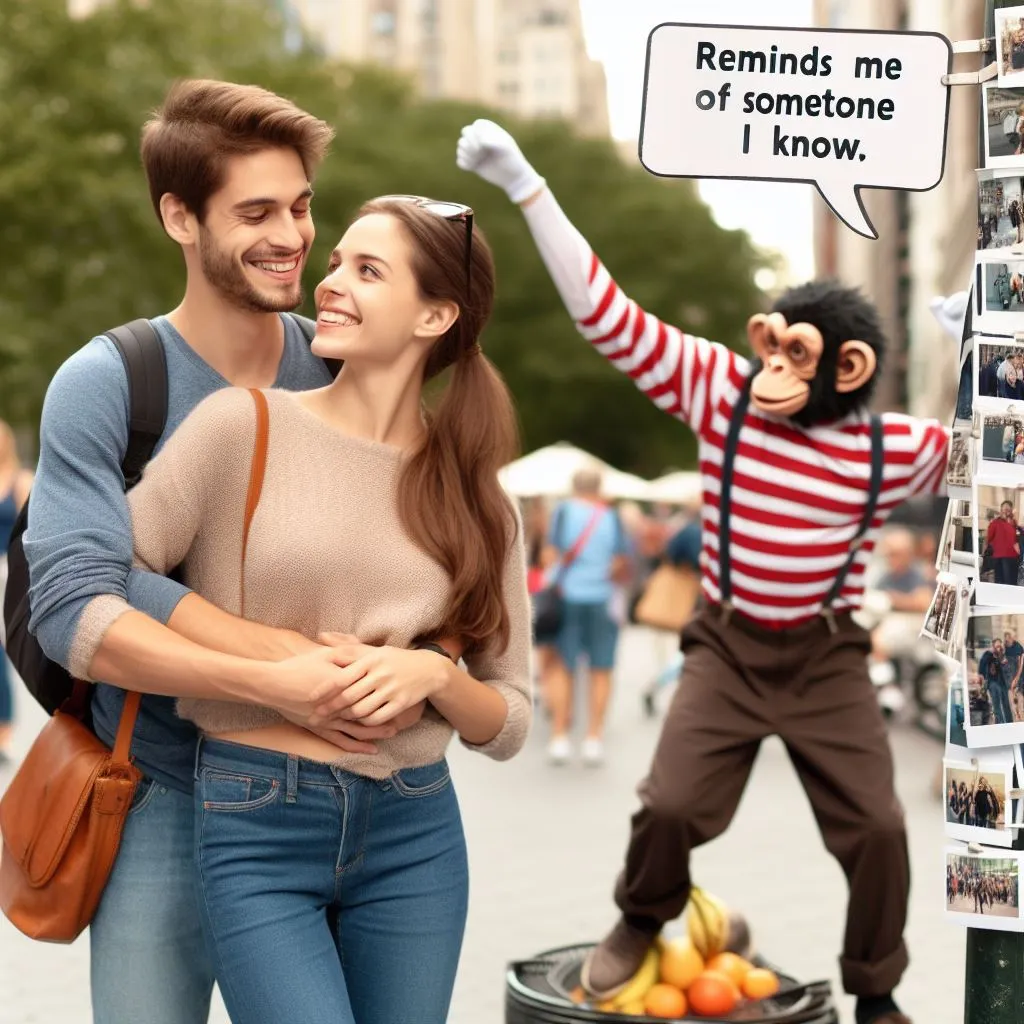Introduction
Intriguingly, have you ever observed yourself pondering over the query, “What does it mean when a guy calls you monkey?” It’s a curious period that may evoke a myriad of emotions and interpretations. From a cute little endearment to a doubtlessly offensive remark, the context in which this word is uttered can appreciably modify its means.
In the realm of relationships, such nicknames hold a unique significance, often reflecting the particular dynamics among people. Understanding the nuances behind those phrases is critical for fostering open communication and keeping off misunderstandings. Let’s delve deeper into the sector of nicknames and uncover the true essence in the back of being called a “monkey.”
Key Takeaways
- Understand the psychology of nicknames. See their importance in relationships.
- Understand the evolution of the term “monkey.” It is used as an endearment or insult and has cultural importance.
- Learn how to interpret the intentions behind being called a monkey. Do this through a guy in the context of a courting.
- Discover factors to consider. These include relationship dynamics and tone. They are important when deciphering the meaning behind nicknames.
- Recognize signs that the term “monkey” may be used affectionately. It may also carry negative connotations.
- Get tips for using and addressing nicknames in relationships well.

The Psychology Behind Nicknames
Nicknames have a fascinating role in human interactions, often revealing underlying emotions, cultural influences, and relationship dynamics. Let’s delve into the psychology behind why people use nicknames and their significance, exploring two examples under each heading.
Why Do People Use Nicknames?
Nicknames serve various purposes, from expressing affection to exerting power dynamics. Here are two common reasons:
- Affection and Familiarity: When a person calls you a “monkey,” it’d appear unusual in the beginning glance. However, in many cultures, regarding loved ones with animal-related terms is an adorable way to reveal endearment. For example, in a few languages, calling a person a “little bunny” is a common term of endearment, similar to calling someone a “monkey” in English.
- Personalization and Connection: Nicknames regularly stand up from shared reports or characteristics. For example, if someone has a mischievous or playful personality, they might be affectionately classified as a “monkey” through buddies or their own family. This nickname can create an experience of belonging and reinforce social bonds within a set.
The Importance of Nicknames in Social Networks
Nicknames play a crucial role in shaping relationship dynamics and communication. Here are approaches that impact relationships:
- Expressing Intimacy: In romantic relationships, nicknames can symbolize closeness and intimacy among partners. For instance, a boyfriend would possibly affectionately name his female friend “monkey” in a playful manner to specific love and affection. This term of endearment creates a feeling of exclusivity and connection among the couple.
- Communication of Feelings: Nicknames also can serve as a form of verbal exchange, conveying feelings that phrases on my own might not be precise. When someone says, “You’re my little monkey,” it conveys warm temperature, fondness, and a feeling of safety. This use of language strengthens emotional bonds and fosters deeper connections among people.
Examining the meaning of “monkey”
When someone calls you a monkey, it may evoke diverse emotions and interpretations relying on the context and cultural and historical past. Let’s delve into the fascinating records and evolution of this term, at the side of its cultural significance.
A. The history and origin of calling someone a monkey
- Racist Connotations: Historically, the term “monkey” has been utilized in a derogatory manner, mainly toward humans of African descent. It stems from the dehumanizing ideology of equating black individuals with animals, perpetuating dangerous stereotypes.
- Example: In the darkish annals of history, the period “monkey” changed into wielded as a weapon of oppression, reflecting the deeply ingrained racism well-known in society.
- Evolution of Language: Over time, the period has developed, yet its roots in racism nonetheless linger in certain contexts. Its usage has elevated beyond its literal means, frequently hired as an insult to demean or belittle someone’s intelligence or conduct.
- Example: While the term “monkey” might also seem risk-free to a few, its records as a racist slur can’t be unnoticed, highlighting the significance of information the energy of language, and its effect on marginalized communities.
B. The offensive word “monkey” has evolved
- Cultural Associations: The term “monkey” carries cultural luggage, encouraged using centuries of literature, media, and societal attitudes. Its evolution as an insult reflects converting perceptions and attitudes closer to race, intelligence, and behavior.
- Example: In literature and popular tradition, characters depicted as monkeys are regularly portrayed as mischievous, silly, or lacking in intelligence, perpetuating harmful stereotypes and reinforcing the insult’s terrible connotations.
- Modern Usage: In cutting-edge discourse, the period “monkey” is now and then used casually or humorously, without its original racist reason. Its use remains arguable, though, with some contending that it feeds into systemic racism and reinforces negative preconceptions.
- Example: Although others may contend that calling a person a monkey is simply lighthearted humor, it’s crucial to apprehend the racial overtones at play and not forget the effect our words have on other human beings.

C. Cultural significance of monkeys in different societies
- Symbolism and Mythology: Monkeys hold numerous cultural importance throughout the globe, symbolizing the whole lot from expertise and mischief to fertility and safety. In many societies, they function prominently in folklore, mythology, and religious symbolism.
- Example: In the Chinese way of life, the monkey is respected as an image of cleverness, resourcefulness, and agility, as seen within the mythical parent of Sun Wukong, the Monkey King.
- Environmental Conservation: Beyond their symbolic importance, monkeys play an essential characteristic in ecosystems globally. As primates, they percentage a close to evolutionary relationship with human beings, serving as essential signs and symptoms of environmental fitness and biodiversity.
- Example: Conservation efforts geared toward shielding monkey species now not handiest safeguard those charming creatures but additionally help preserve the sensitive balance of ecosystems and sell biodiversity conservation.
Understanding “Monkey” in the Context of Relationships
When it involves interpreting the because of this in the back of a person calling you a monkey, it can be quite the top-scratcher. Let’s delve into the possible interpretations and a manner to parent the intentions in the back of this ordinary nickname.
Possible Meanings Behind Being Called a Monkey by a Guy
- Endearing Affection: In many instances, being known as a monkey by way of a man is meant to be a period of endearment. Just like how we would name a person “sweetheart” or “darling,” regarding you as a monkey needs to signify fondness and closeness.
- Example: “He’ll reply to my stupid jokes with a playful ‘You little monkey!’ and a grin.”
- Playful Teasing: Guys often use playful banter as a manner to connect and have amusing with someone they like. Calling you a monkey might be his quirky way of teasing you in a lighthearted manner.
- Example: “During our video chats, he’d giggle and say, ‘You’re any such cheeky little monkey!’ as we traded witty comments.”
How to Ascertain the Goals Associated with the Nickname
- Observe Context and Tone: Pay near hobby to the context wherein the period is used and the tone of voice accompanying it. Is he pronouncing it with a grin and a twinkle in his eye, or does it come upon as mocking or derogatory?
- Example: “When he calls me a monkey in a joking tone at some point of our walks, I’m positive it’s just his way of being playful.”
- Communicate Directly: When doubtful, don’t hesitate to invite the individual to what they imply through the nickname. An easy, “What do you suggest when you name me a monkey?” can clear up any confusion and provide insight into their intentions.
- Example: “I decided to invite him about it immediately, announcing, ‘Hey, when you call me a monkey, what’s that every one approximately?’”
Things to Take Into Account When Determining the Significance
Relationship Dynamics Between the Two Individuals
In a friendly or romantic relationship, calling someone a monkey might be endearing or playful. For example:
- John playfully referred to Sarah as a monkey when she made a funny face at some stage in their video name.
- In a near-knit organization of buddies, referring to each other as monkeys might be a commonplace shape of affection.
Tone and Context in Which the Term Is Used
The tone and context play an important role in determining whether being known as a monkey is meant affectionately or derogatorily. Consider those eventualities:
- If stated with a grin and a light-hearted manner, being referred to as a monkey might also indicate fondness.
- However, if the period is utilized in an extreme or mocking tone, it may be perceived as insulting.
The Person’s Sensitivities and Views
Individuals may also have special reactions based on their private reports and sensitivities. What one man or woman finds amusing, another may also locate offensive. For example:
- Some humans can also moreover find being referred to as a monkey endearing and humorous, viewing it as a playful nickname.
- On the other hand, folks who’ve confronted discrimination or racial stereotypes might probably take offense at being likened to a monkey.

Signs that the term is being used affectionately
When a person refers to you as a “monkey,” it can be pretty confusing, especially in case you’re unsure of the goal behind the term. However, positive signs and symptoms imply the term is being used affectionately instead of derogatorily. Here are examples that will help you decipher what it means:
Body language and tone of voice
- Friendly Demeanor: Pay attention to the individual’s body language. If they’re smiling, preserving eye touch, and their tone of voice is heat and playful, they’re probably endearingly the use of the period.
- Context of Interaction: Consider the context of your interplay with the fellow. If you have a positive rapport and a history of playful banter, being called a “monkey” could simply be an extension of that dynamic.
Previous interactions with the guy
- Past Nicknames: Reflect on any previous nicknames or terms of endearment the guy has used for you. If “monkey” aligns with other affectionate terms he’s used in the past, he probably means it in a similar affectionate context.
- Observation of Others: Observe how the guy interacts with others. If he commonly uses playful or quirky language with his friends and acquaintances, then calling you a “monkey” might just be part of his natural speech pattern.
Signs that the Term May Have Negative Connotations
Context in Which the Term is Used
- Derogatory Insult: Unfortunately, there are times wherein being called a “monkey” incorporates derogatory undertones. If applied in a demeaning or disparaging way, it may be deeply hurtful and indicative of underlying prejudice or disrespect. Example: “Why are you performing like this sort of dumb monkey? Can’t you do anything right?”
- Racist Connotations: In positive contexts, specifically thinking about historical and cultural sensitivities, labeling someone, in particular a person of shade, as a “monkey” can be deeply offensive and perpetuate racial stereotypes.Example: “Go return to the jungle, you filthy monkey!”
Emotions and Responses to the Monkey Label
- Hurt or Offended: When faced with the period utilized in a derogatory fashion, people are likely to enjoy emotions of harm, anger, or offense. It can shatter shallowness and breed resentment closer to the culprit. Example: “I can’t consider he referred to as me that. It’s so disrespectful and uncalled for.”
- Discomfort and Unease: Even if now not supposed as a direct insult, a few individuals may additionally feel uncomfortable or uneasy being called a “monkey,” specifically if they understand it as belittling or infantilizing.Example: “It just doesn’t sit properly with me while he calls me that. It feels wrong somehow.”
In essence, the significance of being referred to as a “monkey” by a man hinges greatly upon the context in which the period is used and the underlying dynamics of the relationship. While it could range from playful affection to hurtful insult, it’s essential to parent the rationale behind the phrases and speak overtly if they propose soreness or offense.
Communication Tips for Addressing Being Called a Monkey
A. Open and Honest Conversation
Engaging in open and honest dialogue is essential when confronted with derogatory language like being called a monkey. Here’s how you can approach the situation:
- Express Your Feelings: When someone calls you a monkey, say something. Let them recognize how their words made you sense. For instance, you may say, “That’s not a pleasant aspect to say. I experience harm through your remark.”
- Educate Others: Take the opportunity to educate the character on the impact of their words. Explain that the usage of phrases like “monkey” can perpetuate stereotypes and make contributions to discrimination.
B. Setting Boundaries and Expressing Discomfort
It’s vital to set barriers and explicit soreness whilst confronted with offensive language. Here are a few steps you can take:
- Assert Yourself: Sound assured and assertive whilst addressing the problem. Let the character realize that such language is unacceptable to you.
- Establish Boundaries: Communicate your obstacles and let the individual understand that using derogatory phrases will no longer be tolerated in your presence.

C. Teaching People About the Power of Their Words
Many human beings may not recognize the dangerous impact of their phrases. As such, it’s critical to teach them why language is irrelevant. Here’s how you may do it:
- Provide Context: Offer context around why terms like “monkey” can be offensive. Explain the historical and dictionary definitions of the term, highlighting its derogatory connotations.
- Encourage Empathy: Help the person apprehend how their phrases may be hurtful via sharing personal reviews or testimonies of others who’ve been laid low with comparable language.
Getting Around in the Nickname Jungle: My Experience with the “Monkey” Label
In relationships, nicknames can be like vines. They twist and turn, leaving you feeling trapped. My journey through this jungle of affection took a surprising turn. Someone called me a “monkey.”
It changed into at some stage an informal verbal exchange with a set of pals. We were sharing stories about childhood nicknames. The talk turned to the fun names our partners used. I chuckled along. I recalled the loving phrases my lady friend and I exchanged. They ranged from “honey” to “sweetheart.” Little did I know, a monkey was lurking in the shadows of our conversation.
The thread of talk is unwound. A friend told a funny story about a German colleague. In jest, he had called his girlfriend “little monkey.” The room erupted in laughter. But I couldn’t shake off a nagging feeling of soreness. The phrase “monkey” reverberated in my mind, triggering a cascade of mind.
I’d always associated the period “monkey” with its wild, uncivilized connotations. In my mind, it conjured images of primates. They swung from tree to tree, with playful antics and mischievous smiles. Yet, in our discussion, it changed. It became a term of endearment, a lavish show of affection.
Despite the laughter and camaraderie, I couldn’t help but marvel. Would I feel the same if someone called me a “monkey”? Would I mechanically take offense, or could I agree with the playful purpose behind the label?
I reflected on the trend of nicknames and their evolving meanings. I found out that phrases, like vines in a dense forest, can adapt. What might seem ridiculous or offensive to 1 person will be a cute and affectionate term for another. It’s all about the context, the surroundings in which the words arise, and the intentions in the back of them.
As I navigated this linguistic jungle, I came to see that nicknames, like monkeys, are numerous. They can evoke laughter or pain, depending on who’s using them and how they’re acquired. Some people stick to standard endearments. Others might find joy in playful banter as a “monkey” or a “bear.”
In the end, what topics most is verbal exchange. If a nickname bothers you, speak up. After all, in the big web of relationships, it’s OK to pick positive phrases over others. It’s like a monkey swinging from branch to branch. It navigates the ups and downs of human connection. It’s critical to not forget that we’re all lively individuals in this jungle of love and language.
FAQs: What does it mean when a guy calls you monkey
How does the portrayal of “monkey” when someone calls you that affect perceptions in English-speaking cultures?
When a person calls you “monkey,” it can virtually shape how others perceive you, particularly within English-speakme cultures. It’s no longer pretty much the literal that means; it contains connotations of being as compared to an ape, which may be degrading or dismissive.
Have you encountered any viral videos where someone is called a monkey, and if so, how did the situation unfold?
Yeah, I’ve come upon some viral videos where people are referred to as “monkeys,” and it is no longer in a cute manner at all. Usually, the situation unfolds with surprise and offense, sparking heated debates within the feedback phase.
Can you elaborate on the trend of using the term “monkey” in video content, and its implications on social discourse?
The fashion of the usage of the term “monkey” in video content material is kinda alarming. It’s like saying someone resembles an ape, which mechanically triggers negative reactions. This can occur especially in English-talking communities, where the term is occasionally used as a racist slur.
What do you think it means when a guy in an English-speaking context calls you a monkey during a video call?
If a man in an English-speaking context calls you “monkey” throughout a video call, it’s critical to ask the man or woman what they suggest with the aid of it. Sometimes, it could be intended playfully or innocently, however different instances, it can convey derogatory rationale.
In English speaking communities, what are common responses when someone is called a monkey? This is especially in the context of video interactions.
In English-speaking communities, the responses to being known as “monkey” can range loads. Some humans would possibly brush it off, whilst others might say it’s a racist period and take offense. It relies upon the individual and the context in which the term is used.
Conclusion: What does it mean when a guy calls you monkey
- In conclusion, “monkey” can mean many things. It can range from fondness to racism.
- You must understand the context and intentions behind nicknames. This is key for navigating relationships well.
- Some may find joy in playful puppy names like “monkey.” But, others can be offended. Especially, if the name is racist or derogatory.
- Communication is key. It helps with discomfort and misunderstandings from nicknames. It allows for open and sincere speech among partners.
- Let’s understand the words we use and their impact on others. Let’s foster a tradition of admiration and empathy in our relationships.
Call to Action:
- Start a chat with your partner or loved ones. Talk about the nicknames you use and how they make you feel.
- Educate yourself and others about the potential implications of positive phrases. These are specifically those with racist undertones.
- Promote a caring society. Consider character feelings when choosing pet names.
- Let’s work together to remove harmful words and stereotypes. Let’s build a society where everyone feels appreciated and respected.

Sarah Andrews’ work on relationships is informed by a breadth of experience and a strong interest in human nature. Sarah, who holds a Psychology degree and has a good eye for nuances, delves into the complexity of communication and emotion, delivering insightful insights for readers seeking personal growth and emotional pleasure. Sarah hopes that her empathic approach and insightful suggestions will motivate readers to understand themselves and their relationships better.
